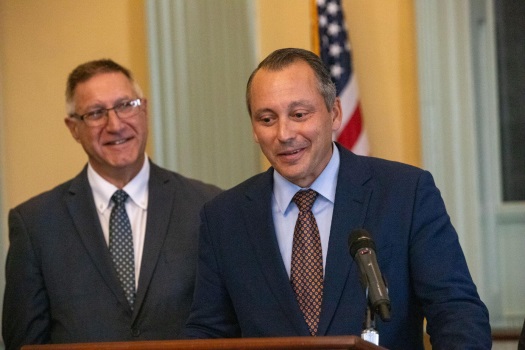latest
Massachusetts lawmakers approve $251 million more for family shelter system, impose limit on how long families can stay

Chris Lisinski, Colin A. Young, Michael P. Norton
APRIL 25, 2024…..The House voted 117-36 and the Senate 29-9 to approve a supplemental budget steering $251 million more into the family shelter system and calling for new limits on how long families may stay in shelters.
The agreement announced Wednesday afternoon would pull the $251 million from the so-called Transitional Escrow Account to help pay for fiscal 2024 shelter system costs, with another $175 million from the fund available in the new budget year that starts July 1. It also imposes a new nine-month limit on how long families can stay in the state’s emergency shelters, with up to two 90-day extensions available to some and a new hardship waiver process.
The bill was enacted and sent to Gov. Maura Healey’s desk at 4:30 p.m. Thursday.
“The issues we are taking up today are not easy ones. With the federal government completely missing in action on the migrant crisis, we are alone in confronting this challenge. The changes that are being offered in this bill would still leave the commonwealth with by far the most generous length of stay in the nation, with places like New York City and Chicago measuring caps in days, not months,” House Ways and Means Chairman Aaron Michlewitz said when he introduced the compromise bill in the House. “By making these temporary adjustments, we will ensure the sustainability of the right to shelter law here in the commonwealth for years to come.”
While Michlewitz celebrated the generosity of the Massachusetts shelter system, Minority Leader Brad Jones said one could instead “lament the fact that we have the most generous situation in the country because we’re paying the price for it.” He called the conference committee report, which passed the House without a single Republican vote, “a funding bill to kind of keep the problem going in Massachusetts.”
“When we pass this legislation today … you’re gonna find that we’ve laid out in excess of a billion dollars to address this issue. It is absolutely crowding out our ability to do any number of other things that we need, want and should do in the commonwealth. And it’s unnecessary,” Jones said. He added, “I represent four committees, and at least three of those committees are actively talking about the overrides they need to do to provide essential services at the municipal level. And part of this billion dollars could easily be done and redirected to our cities and towns to help them address some of the needs that they have to face.”
All 25 House Republicans voted against the compromise bill, as did independent Rep. Susannah Whipps of Athol and 10 Democrats: Cambridge Rep. Mike Connolly, Taunton Rep. Carol Doherty, Dracut Rep. Colleen Garry, Leominster Rep. Natalie Higgins, Hull Rep. Joan Meschino, Tewksbury Rep. David Robertson, Pepperell Rep. Margaret Scarsdale, Acton Rep. Dan Sena, Somerville Rep. Erika Uyterhoeven, and Gardner Rep. Jonathan Zlotnik. Doherty later voted to enact the bill.
On the other side of the State House, the Senate’s four Republicans opposed the measure joined by five Democrats: Sens. Nick Collins of Boston, John Cronin of Fitchburg, Jamie Eldridge of Marlborough, Walter Timilty of Milton and John Velis of Westfield.
The Democrat-only passage of the shelter funding deal drew quick rebukes from conservatives at the Mass. Republican Party and Mass. Fiscal Alliance.
“Two things have become apparent: Governor Healey clearly can’t secure federal funds to address the ongoing budget needs, and President Biden isn’t going to do a thing to stop the crisis at the border. That leaves us with only one option, and it’s to amend the right to shelter law to have at least a six-month residency requirement to qualify for emergency shelter,” MassGOP Chairwoman Amy Carnevale said in a statement Thursday.
Senate Ways and Means Committee Chair Michael Rodrigues, the lead negotiator from his chamber, called the final compromise “a fiscally responsible, humane and sustainable response to the ongoing emergency assistance shelter crisis.”
“As we all know, the projected cost of the state’s emergency shelter program is on an unsustainable trajectory, and there is no federal assistance in sight,” Rodrigues said on the Senate floor. “Without action, it will continue to undercut the collective work we all have engaged in over these last few years to support our state’s fiscal year.”
“It’s important to remember who we’re talking about here, ultimately: families with young children, who deserve nothing more than our help and a path out of the shelter system and into self-sufficiency,” he added.
Senate Minority Leader Bruce Tarr described the combined bottom line of about $426 million an “improvement” over the chamber’s initial proposal, which would have made even more state savings available for shelter spending in fiscal 2025, but argued that it fell short on reforms to the system such as prioritizing services for Massachusetts residents.
“It is heartening to see at one level that the House and the Senate are now poised to amend the right to shelter law. That being said, the question is: how best to amend the right to shelter law? While there are some changes here relative to the duration that a family could remain in shelter, the major elements of reform are left untouched,” Tarr, a Gloucester Republican, said.
If Healey approves the latest injection of funding, it would push the total amount Beacon Hill has appropriated to the emergency assistance shelter system over the course of fiscal 2024 to about $826 million — more than four and a half times as much as the state spent on the program in fiscal 2021.
The bill also sets a foundation of up to $175 million in state savings that can be redirected toward shelters in fiscal 2025. Both the House and Healey want to provide another $325 million through the annual state budget.
It’s not clear if a combined half-billion dollars will be sufficient to manage need through the entirety of fiscal year 2025. Healey deputies previously estimated the state would need to spend more than $900 million on the shelter system next fiscal year, but that projection was produced before lawmakers voted to cap the maximum length of stay.







Fed Up
April 25, 2024 at 6:01 pm
Where is this money coming from? Oh yeah from anyone and everywhere they can get it Tibbits-Nuut approved
Dlafleur
April 25, 2024 at 10:24 pm
Time to throw Michael Rodrigues out. Maybe Alan Silvia too.